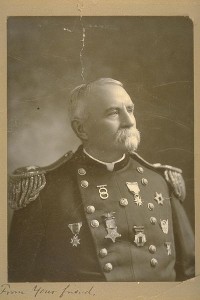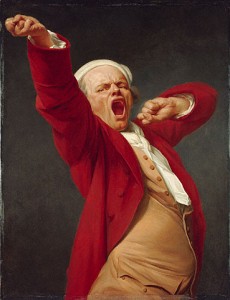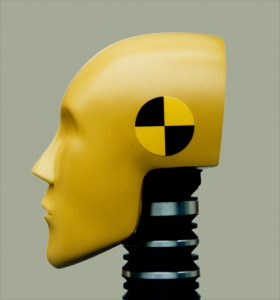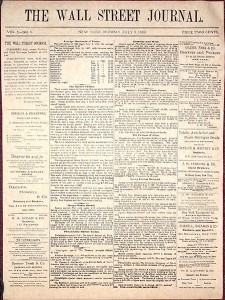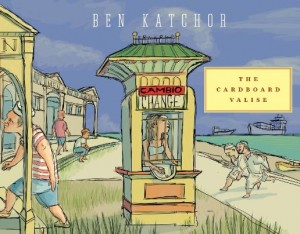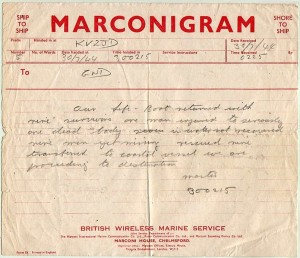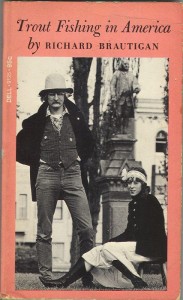Suitcase-sized cell phones.
I blogged recently about an excellent thumbnail description of Ben Katchor’s artistic heritage which ran on the Los Angeles Review of Books site, and that same site just published the first part of “The Ghost of Wrath,” a revisionist nine-part series about eminent (and hated) Angeleno Harrison Gray Otis that was written by Mike Davis. Otis is the original force behind the Los Angeles Times, and one of the chief “inventors” of modern L.A. The first few paragraphs:
“General Harrison Gray Otis is the wrathful gargoyle with a walrus moustache and Custer goatee who glowers down on us from the battlements of Los Angeles’s Open Shop era. The proprietor of Times-Mirror Company from 1882 to 1917, he was recently hailed in a PBS documentary as the ‘inventor’ of modern Los Angeles, both as an individual and via his descendants, the Chandler family.
Yet his eminence in the city’s history is cast almost entirely as shadow. Five or six serious books have been written about the Los Angeles Times and the Chandlers, but there is no published biography of the dynasty’s founder and leviathan. This is a major missing thread in the narrative tapestry of the current renaissance of Los Angeles history, but given the archival and literary obstacles in any potential biographer’s path, it is not surprising.
First, no one has yet excavated the pharaoh’s tomb. Rumors abound, especially in the tearoom of the Huntington Library, about family archives kept in a San Marino vault. But it is also possible that son-in-law and successor, Harry Chandler, destroyed many of Otis’s private papers when he ordered his own files burned after his heart attack in 1944. (Chandler might have been reacting to the literary and cinematic assaults on fellow-publisher and chief competitor, William Randolph Hearst.)
Second, any biographer has to tackle the fact that Otis was probably the most hated man in Ragtime America. His enemies ecumenically spanned a spectrum from evangelists to citrus growers, socialists to robber barons. Although chiefly remembered for his relentless crusade to destroy the labor movement in Los Angeles, Otis waxed most savage in his attacks on reformers within his own Republican Party. Progressive Republicans, in turn, repaid his vitriol with eloquent interest.”
Tags: Harrison Gray Otis, Mike Davis
In Cloquet, Minnesota. (Thanks Open Culture.)
Tags: Frank Lloyd Wright
My 90 year old neighbor just called me a dish
My neighbor was widowed recently after 64 years of marriage and professed to being very lonely. I never knew his wife since I am considerably younger than his 90 years (58). We have been sharing a bottle of wine a couple of times a week and I have felt that his obvious infatuation was natural and healthy and healing. Thing is, I find him attractive too…but frail! Tonight, he tells me that I’m a “dish” and he’s horny. What should I do? I’m horny too. Should I demand a visit to his physician to make sure that he is physically able to have sex or should I just figure, “what the hell, he’ll die happy?”
I am single and without a lover at the moment. I like sex. But, as a boomer, will my openess freak this guy out? He wants to drive me home! Did I mention that I live next door? OK, country properties, so it’s a 100 yard trek but I’m not used to such gallantry!
I am interested in thoughtful comments and thank you all for considering the situation.
••••••••••
More posts mocking Larry King for no good reason:
In the future, Bill James’s 2009 statement about performance-enhancing drugs will likely be proven right:
“If we look into the future, then, we can reliably foresee a time in which everybody is going to be using steroids or their pharmaceutical descendants. We will learn to control the health risks of these drugs, or we will develop alternatives to them. Once that happens, people will start living to age 200 or 300 or 1,000, and doctors will begin routinely prescribing drugs to help you live to be 200 or 300 or 1,000. If you look into the future 40 or 50 years, I think it is quite likely that every citizen will routinely take anti-aging pills every day.”
Tags: Bill James
In her 2009 New Yorker article about neuroenhancers, Margaret Talbot explains the concept of “mission creep,” whereby a pharmaceutical created for one purpose is pushed into other more suspect treatment areas by drug companies looking to further monetize a product:
“The Lynches said that Provigil was a classic example of a related phenomenon: mission creep. In 1998, Cephalon, the pharmaceutical company that manufactures it, received government approval to market the drug, but only for ‘excessive daytime sleepiness’ due to narcolepsy; by 2004, Cephalon had obtained permission to expand the labelling, so that it included sleep apnea and ‘shift-work sleep disorder.’ Net sales of Provigil climbed from a hundred and ninety-six million dollars in 2002 to nine hundred and eighty-eight million in 2008.
Cephalon executives have repeatedly said that they do not condone off-label use of Provigil, but in 2002 the company was reprimanded by the F.D.A. for distributing marketing materials that presented the drug as a remedy for tiredness, ‘decreased activity,’ and other supposed ailments. And in 2008 Cephalon paid four hundred and twenty-five million dollars and pleaded guilty to a federal criminal charge relating to its promotion of off-label uses for Provigil and two other drugs. Later this year, Cephalon plans to introduce Nuvigil, a longer-lasting variant of Provigil. Candace Steele, a spokesperson, said, ‘We’re exploring its possibilities to treat excessive sleepiness associated with schizophrenia, bipolar depression, traumatic injury, and jet lag.’ Though she emphasized that Cephalon was not developing Nuvigil as a neuroenhancer, she noted, “As part of the preparation for some of these other diseases, we’re looking to see if there’s improvement in cognition.'”
Another post about Nuvigil:
Tags: Margaret Talbot
If we seem to be forgetting more, it’s only because there’s much more to remember. Unsurprisingly, our brains have begun to use the Internet as our key external memory system, not retaining information that we know we can look up. It’s inevitable since our memories have never been incredibly elastic and more information than ever is available. Memory augmentation of some sort is also probably inevitable. From a New York Times story about memory research:
“The scientists, led by Betsy Sparrow, an assistant professor of psychology at Columbia, wondered whether people were more likely to remember information that could be easily retrieved from a computer, just as students are more likely to recall facts they believe will be on a test.
Dr. Sparrow and her collaborators, Daniel M. Wegner of Harvard and Jenny Liu of the University of Wisconsin, Madison, staged four different memory experiments. In one, participants typed 40 bits of trivia — for example, ‘an ostrich’s eye is bigger than its brain’ — into a computer. Half of the subjects believed the information would be saved in the computer; the other half believed the items they typed would be erased.
The subjects were significantly more likely to remember information if they thought they would not be able to find it later. ‘Participants did not make the effort to remember when they thought they could later look up the trivia statement they had read,’ the authors write.”
The amazing Hiroshi Teshigahara and a band of peers collaborated on this stylized 24-minute documentary, “Tokyo 1958.” No English subtitles, but the visuals and score easily carry it.
This story about a soused monkey originally ran in the Louisville Courier-Journal and was reprinted in the August 2, 1901 Brooklyn Daily Eagle. An excerpt:
“The unusual spectacle of an intoxicated monkey, gaudily dressed in red and gold, throwing nickels and pennies at a crowd of children almost resulted in a tragedy on Chestnut Street the other morning.
The monkey was more intelligent than most of his race. He wasn’t young and his queer behavior could not be attributed to his inexperience. Of course, he was the property of an organ grinder. Up beyond First Street, the ‘musician’ stopped and ground out ‘I’d Leave My Happy House for You,’ always a favorite with the neighborhood students.
At a second story window, the little beast saw a young man standing. The stranger beckoned and the monkey quickly climbed to him. The window was opened and the little climber disappeared within. Five minutes later he climbed down the lightning rod. After that the whole monkey family would have been scandalized could they have witnessed his actions. For a block he was unruly. Then he began to separate himself from the money which he had collected . Nickels flew in every direction.
But the animal kept on jabbering. It was not his fault that he was drunk. When he went to the second story window the young man offered him whisky soaked bread and the animal ate heartily.”
Kilt wanted (Harlem / Morningside)
Can anyone help a poor soul with a kilt in a large size? I don’t know what size I would actually wear cause I never had, nor, wore a kilt
But dreamed of owning one, however I cannot afford $400. for one. I wear 34″ w L. Please help! Thank you.
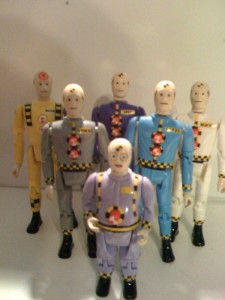
"They viewed humans as essentially good, influenced by rational deliberation, and tending towards co-operation."
From Evgeny Morozov’s concise history of the Internet at Prospect:
“But studying the history of the internet is impossible without studying the ideas, biases, and desires of its early cheerleaders, a group distinct from the engineers. This included Stewart Brand, Kevin Kelly, John Perry Barlow, and the crowd that coalesced around Wired magazine after its launch in 1993. They were male, California-based, and had fond memories of the tumultuous hedonism of the 1960s.
These men emphasised the importance of community and shared experiences; they viewed humans as essentially good, influenced by rational deliberation, and tending towards co-operation. Anti-Hobbesian at heart, they viewed the state and its institutions as an obstacle to be overcome—and what better way to transcend them than via cyberspace? Their values had profound effects on the mechanics of the internet, not all of them positive. The proliferation of spam and cybercrime is, in part, the consequence of their failure to predict what might happen as a result of the internet’s open infrastructure. The first spam message dates back to 1978; now, 85 per cent of all email traffic in the world is spam.
Perhaps the cheerleaders’ greatest achievement was in wresting dominance of the internet from the founding engineers, whose mentality was that of the Cold War. These researchers greatly depended on the largesse of the US department of defence and its nervous anticipation of a nuclear exchange with the Soviet Union. The idea of the ‘virtual community’—the antithesis of Cold War paranoia—was popularised by the writer and thinker Howard Rheingold. The term arose from his experiences with Well.com, an early precursor to Facebook.”
•••••••••
Evgeny Morozov argues that the Internet strenghtens dictatorial regimes, in his contrarian TED Talk:
Tags: Evgeny Morozov
Occasional smoker Tom Snyder talks to Durk Pearson and Jerry Pournelle about media changes on the horizon, including the death of newsprint.
Tags: Durk Pearson, Jerry Pournelle, Tom Snyder
Always loved the deeply funny and deeply humanistic short story, “Sea Oak,” by George Saunders. Included in the Pastoralia collection, it uses the B-movie trope of the reanimation of the dead, as recently deceased Aunt Bernie rises from the grave to bring some order to her dysfunctional, at-risk family. Read the whole story here. An excerpt
“Where the grave used to be is just a hole. Inside the hole is the Amber Mist, with the top missing. Inside the Amber Mist is nothing. No Aunt Bernie.
‘What the hell,’ says Jade. ‘Where’s Bernie?’
‘Somebody stole Bernie?’ says Min.
‘At least you folks have retained your feet,’ says Father Brian. ‘I’m telling you I literally sat right down. I sat right down on that pile of dirt. I dropped as if shot. See that mark? That’s where I sat.’
On the pile of grave dirt is a butt-shaped mark.
The cops show up and one climbs down in the hole with a tape measure and a camera. After three or four flashes he climbs out and hands Ma a pair of blue pumps.
‘Her little shoes,’ says Ma. ‘Oh my God.’
‘Are those them?’ says Jade.
‘Those are them,’ says Min.
‘I am freaking out,’ says Jade.
‘I am totally freaking out,’ says Min.
‘I’m gonna sit,’ says Ma, and drops into the golf cart.
‘What I don’t get is who’d want her?’ says Min.
‘She was just this lady,’ says Jade.
‘Typically it’s teens?’ one cop says. ‘Typically we find the loved one nearby? Once we found the loved one nearby with, you know, a cigarette between its lips, wearing a sombrero? These kids today got a lot more nerve than we ever did. I never would’ve dreamed of digging up a dead corpse when I was a teen. You might tip over a stone, sure, you might spray-paint something on a crypt, you might, you know, give a wino a hotfoot.’
‘But this, jeez,’ says Freddie. ‘This is a entirely different ballgame.’
‘Boy howdy,’ says the cop, and we all look down at the shoes in Ma’s hands.'”
••••••••••
Another George Saunders post:
Tags: George Saunders
Ooh, Talkies! My favorite kind of pictures, apart from Weepies.
How incredibly disingenuous of key Wall Street Journal stockholders to state publicly that they never would have sold the vaunted publication to Rupert Murdoch and News Corp. if they had known the company was involved in telephone hacking. Bullshit. While they didn’t know the company was hacking phones, they absolutely knew that it was built on sleazy, dishonest practices, intent on misinforming the public and promoting a warped political agenda. That should have been enough. They simply did at the time what they felt was in the best interests of their stockholders, themselves, and, I suppose, the paper. But feigning disgust over News Corp. business practices now is nonsense.
From the Lede blog at the New York Times:
“‘If I had known what I know now, I would have pushed harder against’ the Murdoch bid, said Christopher Bancroft, a member of the family which controlled Dow Jones & Company, publishers of The Wall Street Journal. Bancroft said the breadth of allegations now on the public record ‘would have been more problematic for me. I probably would have held out.’ Bancroft had sole voting control of a trust that represented 13 percent of Dow Jones shares in 2007 and served on the Dow Jones Board.”
Tags: Christopher Bancroft
A 1981 interview with famed street photographer Garry Winogrand.
Winogrand’s shooting style, as recalled by a former student: “We quickly learned Winogrand’s technique–he walked slowly or stood in the middle of pedestrian traffic as people went by. He shot prolifically. I watched him walk a short block and shoot an entire roll without breaking stride. As he reloaded, I asked him if he felt bad about missing pictures when he reloaded. ‘No,’ he replied, ‘there are no pictures when I reload.’ He was constantly looking around, and often would see a situation on the other side of a busy intersection. Ignoring traffic, he would run across the street to get the picture.
Incredibly, people didn’t react when he photographed them. It surprised me because Winogrand made no effort to hide the fact that he was standing in way, taking their pictures. Very few really noticed; no one seemed annoyed. Winogrand was caught up with the energy of his subjects, and was constantly smiling or nodding at people as he shot. It was as if his camera was secondary and his main purpose was to communicate and make quick but personal contact with people as they walked by.”
Tags: Garry Winogrand
In a smart Atlantic article, “India Invents a City,” Jeremy Kahn looks at Lavasa, a planned, high-tech hilltop urban development which may or may not be a model for Indian cities of tomorrow. The opening:
“At first glance, this could be Italy—the promenade, the sidewalk cafés and ice-cream parlors, the streetscape of conjoined little apartment houses in mustard, terra-cotta, ocher, olive, or beige. Even the name of the place, Lavasa, sounds vaguely Italian.
But look again, and this clearly isn’t Italy. It’s too clean, too new. There are too few tourists. There are hardly any people at all, actually. Which only makes it all the more improbable that Lavasa is, in fact, in India—land of auto rickshaws and slum dogs, of sweat and dust and litter. With only a handful of residents, Lavasa is a city-in-waiting. But its corporate backers believe it will soon represent nothing less than a new model of urban development and governance in India—a country where the phrase city planning has long been a contradiction in terms.
Lavasa sits in the Western Ghats, some 130 miles southeast of Mumbai, India’s financial and entertainment capital, and 40 miles west of Pune, a growing hub for software programming and computer animation. If all goes according to its master plan, Lavasa will eventually house more than 300,000 people in five distinct ‘towns.’ It will also have a world-class medical campus, luxury hotels, boarding schools, sports academies, a Nick Faldo–designed golf course, a space camp, and, its developers hope, animation and film studios, software-development companies, biotech labs, and law and architectural firms—in short, all of the knowledge industries at the heart of the ‘new India.’ Those industries have yet to buy in, but residential sales have been brisk: in Dasve, the first of Lavasa’s five towns, scheduled to be completed this year, the houses are almost sold out.”
••••••••••
The good people at the Lavasa Corporation are building you a lovely home:
Tags: Jeremy Kahn
Original Corrupt Letter From The International Criminal Court – $2000000 (Anywhere)
I had the International Criminal Court open up a case on my behalf against the United States of America in September of 2007. Through out the course of 2008 someone from the International Criminal Court entered my residence without my knowledge and changed my letter. The date was also changed on the letter from September 23, to October 1st. I was a victim of a bunch of things and murders that happened. I’m interested in selling this letter the French translation page and the English translation page separately to 2 different buyers. That way the letter will be more valuable. I’m looking for offers of $2million dollars and higher per letter.
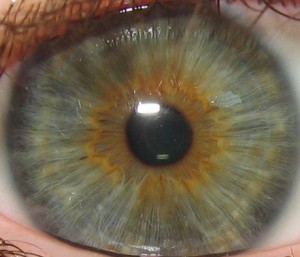
"That photo is then compared with a database of images of people with criminal records." (Image by Matthew Goldthwaite.)
A new iPhone app will allow law-enforcement officers to photograph a person and instantly scan a database of criminals to see if there is a match. It’s inevitable that all of the information we’ve put online will end up in databases that can be monetized or scrutinized. A report from Cnet:
“Some law-enforcement agencies are preparing to deploy a mobile facial-recognition tool, The Wall Street Journal reported today.
According to the Journal, about 40 law-enforcement agencies across the U.S. will be making the handheld product available to their officers in the field as early as September. The device, which has been developed by Massachusetts-based BI2 Technologies, allows officers to take a photo of a person from a distance of five feet or less. That photo is then compared with a database of images of people with criminal records to see if there is a match. The device is also capable of scanning a person’s iris.”
••••••••••
Iris-recognition scanner:
In the Los Angeles Review of Books, Jeet Heer explores a new book by the excellent graphic-comics artist Ben Katchor. The first paragraph of the review sums up the lineage of Katchor’s work perfectly:
“Ben Katchor is the Joseph Mitchell of contemporary comics. Mitchell, along with his close friend A.J. Liebling, was a pivotal early New Yorker reporter who famously made a speciality of describing the peripheral rascals, layabouts, and oddballs of the Big Apple, ranging from the denizens of McSorley’s saloon to Joe Gould, the often homeless bohemian who claimed to be working on an ‘Oral History of the Contemporary World.’ With their cockeyed street-level view of New York and propensity for profiling loopy souls, Mitchell’s works were important precursors to the early Katchor who, throughout the 1980s and 1990s, meticulously chronicled the wanderings of ‘Julius Knipl, Real Estate Photographer’ in the pages of the New York Press (and, later, syndicated in alternative weeklies across the country). The Knipl strips were mournfully muted surveys of a New York where you could still feel the ghostly presence of the older city described by Mitchell in the 1930s and 1940s. “
••••••••••
Ben Katchor’s 2002 TED Talk:
Tags: Ben Katchor, Jeet Heer
Many types of ghost media (telegrams, telex, etc.) that have been seemingly made obsolete by the advent of broadband still actually soldier on. An excerpt from a piece about so-called dead media at Ars Technica:
“Few people send out messages via Morse code any more. But the basic telegram concept—a missive spoken to an operator, then transmitted across wires or wireless, then hand-delivered to a recipient—is alive and well.
In fact, as in the nineteenth century, Telegrams Canada will write your telegram for you—or at least suggest gram language for appropriate occasions. The ‘Get Well’ suggestions include ‘The office/this place is just not the same without you,’ and ‘Your many friends here are hoping for your quick recovery.’
The service isn’t cheap. A same business day telegram costs CAN$19.95 plus 99¢ per word. ‘Quebec usually next business day,’ the company advises. ‘Rural routes and post office boxes may take longer.'” (Thanks Browser.)
•••••••••••
Balki receives a vital telegram:
Stephen Colbert euolgizes the Western Union telegram:
Tags: Balki, Stephen Colbert

"A relative ran into the woodshed after a saw, and began to deliberately saw off about eight inches of the dead man's legs."
Ordering the wrong size coffin is certainly a problem, but some geniuses in Milwaukee managed to make a bad situation worse when burying a very tall former Civil War soldier. An excerpt from a Milwaukee Journal Sentinel story that was reprinted in the June 22, 1884 Brooklyn Daily Eagle:
“Several farmers of Oak Creek, who brought produce to the south side yesterday brought intelligence of a strange burial, which occurred there last Friday. Horace Baldwin died last week of consumption and the funeral was set for Friday. He was a farmer residing on the division line of the towns of Oak Creek and Lake, owning some thirty acres of land, and was in comparatively good circumstances. When the civil war broke out he joined Company K, Twenty-fourth Wisconsin Regiment, known as the Oak Creek Company, because so many natives of Oak Creek were in it. Although but twenty years of age, he was remarkably tall, his army description making him 6 feet 7 inches tall. When his comrades were wounded in the breast he would stop the bullets with his stomach. He was so conspicuously tall that he was given a sobriquet appropriate to his stature. He could not stand army life very well, and soon gave it up. The disease of which he died was contracted in the army. Friday, when the neighbors gathered at the farm house to do honor to his memory by following the remains to the grave, it was found that the coffin was made for a six-footer, and was therefore seven inches too short. The corpse could not be squeezed into the casket, and so, rather than disappoint the people waiting outside, a relative ran into the woodshed after a saw, and began to deliberately saw off about eight inches of the dead man’s legs. He thought the corpse moved and fainted. Thereupon another relative seized the woodsaw and completed the shortening process. The several members were bent back, the coffin lid fastened, and the funeral cortege wended its way to the Oak Creek Cemetery. The story has created a great sensation in Oak Creek, where the act is generally condemned, and a mobbing party was talked of. Luke Scanlan, supervisor from the town, says the story is true. Supervisor Kuenzil also vouches for the truth of the story. He says he has it from a source of undoubted authority.”
Tags: Horace Baldwin
From Lawrence Wright’s 1985 Rolling Stone article about the death of writer Richard Brautigan:
“The old Beats looked at Richard with envy and surprise. The Beats were out of fashion, and Bunthorne was all the rage and he was rich, too, thunderously rich by their standards. Ferlinghetti had been the first to publish parts of Trout Fishing in his City Lights Journal, but like most Beats, he had never taken Richard’s writing seriously. ‘As an editor, I always kept waiting for Richard to grow up as a writer,’ he says now. ‘I never could stand cute writing. He could never be an important writer like Hemingway — with that childish voice of his. Essentially he had a naïf style, a style based on a childlike perception of the world. The hippie cult was itself a childlike movement. I guess Richard was all the novelist the hippies needed. It was a nonliterate age.’
But it was an extraordinary time in every other respect. Cultural forms were exploding in the face of furious experimentation with drugs, art, sex, music, religion, social roles. Richard’s attitude toward all this, however, was ambivalent. He was widely credited with being the voice of the Summer of Love, but in fact he was contemptuous of most hippies, whom he saw as freeloaders and dizzy peaceniks. He had a horror of narcotics that seemed fanciful to his friends everybody used dope in those days except Richard.
His passions were basketball, the Civil War, Frank Lloyd Wright, Southern women writers, soap operas, the National Enquirer, chicken-fried steak and talking on the telephone. Wherever he was in the world, he would phone up his friends and talk for hours, sometimes reading them an entire book manuscript on a transpacific call. Time meant nothing to him, for he was a hopeless insomniac. Most of his friends dreaded it when Richard started reading his latest work to them, because he could not abide criticism of any sort. He had a dead ear for music. Ianthe remembered that he used to buy record albums because of the girls on the covers. He loved to take walks, but he loathed exercise in any other form.”
Another Richard Brautigan post:
Tags: Lawrence Wright, Richard Brautigan

